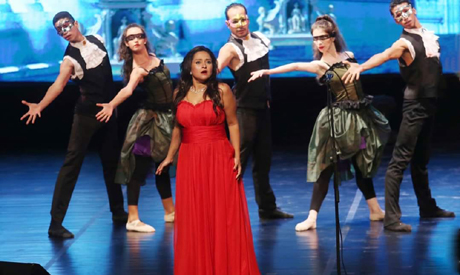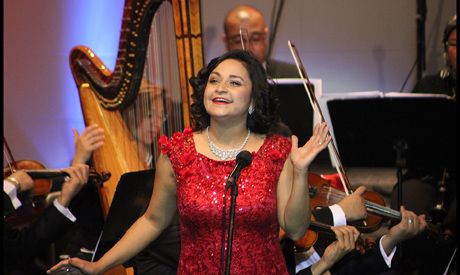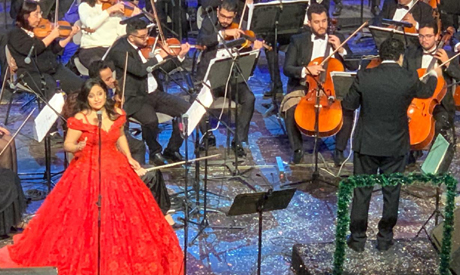The 29th edition of the Citadel Festival for Music and Songs, which continues until the end of the month, honoured the Egyptian soprano Dalia Farouk. The event took place during the opening evening of the festival on 15 August.
One of the stars of the Cairo Opera Company, Farouk has succeeded in carving herself a place on both local and international scenes. Her most recent appearances include the role of the high priestess in the opera Aida staged at the Egyptian Academy of Arts in Rome last July. This was followed by singing aria by Christine from the Phantom of the Opera, during an operatic evening that took place on 19 August within the Citadel Festival.
“I’m happy that the Citadel Festival included evenings showcasing classical music through operatic arias, as well as Neapolitan songs and Broadway excerpts. This was in parallel to evenings focusing on Arabic and oriental music,” says Dalia Farouk, who has been present at this festival since its creation in 1993.
Born in Riyadh, Saudi Arabia, Dalia’s father Farouk Hassanein Makhlouf worked at the United Nations in Geneva and Bern. He was also Minister Plenipotentiary of Commerce, then first economic adviser to the Saudi Minister of Finance.
Her mother, Fadia Al-Qadi, was a radio presenter, a graduate from the Academy of Arts in Egypt, majoring in the performing arts. At 14, Dalia Farouk returned with her mother to Egypt and joined the Cairo Conservatory. This is when her over 25-year professional career began.
“My mom taught me how to sing on stage. My parents helped me develop my talents, whether it was singing or playing the piano. I also loved piano lessons at my Manaret Al-Riyadh school. My father, being a Mozart fan, listen to music at home a lot.
"Thanks to him, I got used to listening to classical music from a very young age,” the soprano reveals.
She was 15-years-old and still a second year student at the Cairo Conservatory when she took her first steps in the field of operatic singing.

(Photo: Dalia Farouk Facebook)
Her broad texture allows her to sing a rich repertoire and her first solo recital took place in 1991 at the Russian Cultural Centre in Cairo. “I recall it very well. I owe its success to my singing teacher at the Cairo Conservatory, Violette Makkar. She was the one who understood my voice."
As Farouk’s career flourished, she became the first soloist of the Cairo Opera Company to be honored in 2011 by Ines Abdel Dayem who at the time headed the Opera and is currently Egypt’s culture minister.
This petite woman carries a great voice inside of her as she comments: "Violette Makkar called me Al-Fatfouta (‘the crumb’). I have always maintained the same weight.”
Mother of two children, Farouk assumes her maternal responsibilities on a daily basis. She wants her children to take psychodrama lessons. “I strongly believe in this kind of therapy. Singing for me is a form of therapy that nourishes the soul and releases negative emotions. Singing is like a sport, an inexhaustible source of energy that allows you to build muscles and relax.” Farouk also likes to read about Sufism, psychotherapy and body language.
Sweet and charming, she enjoys the charisma of the stage. “My first appearance on stage, at the Cairo Opera House was in 1997, in the role of Oscar. I was chosen by Violetta Makkar. I also auditioned for the Bulgarian maestro Ivan Velev and the Egyptian late tenor Hassan Kami, who sang the role of Ricardo,” Farouk recalls, adding that the same year she graduated with honours from the singing department of the Cairo Conservatory.
A year later, following an audition for Italian maestro Alessio Vlad, she was cast as Rosine in a new production for the Cairo Opera directed by Italian Sandro Sequi. The cute and smart soprano brilliantly embodies her character, and doesn't miss an opportunity to improve her performance.

(Photo: Ati Metwaly)
In 1998, she left for training in the United States and two years later obtained a master's degree in vocal performance at UCLA under the supervision of the great tenor Timothy Mussard. At the theater of this prestigious university, she played the role of Thérèse in Les Mamelles de Tirésias by Poulenc. “Thérèse is also very close to me, a great feminist,” she says.
In the United States, she sang at the Albany Theater in New York, Catholic University in Washington, and Indiana University in Bloomington. There, she met the stars of opera: Patricia Wise, Martina Arroyo and Carol Vaness.
“At the Los Angeles Opera, I met the charismatic great tenor Placido Domingo. Making contacts and auditions abroad is very important for the career of an opera singer,” she adds.
After returning to Egypt in 1999, Farouk sang Musetta in Puccini's La Bohème at the Cairo Opera, a role that suits her voice perfectly. “I was chosen for the role after an audition for Italian maestro Alessio Vlad. Musetta is a beautiful and rich girl, mischievous, bohemian, carefree with big dreams. I'm a bit like her, a jovial, outgoing and simple person, but I have nothing to do with her bohemian life though. On the contrary, I am pragmatic by nature.”
In 2001, she received a Fulbright Foundation scholarship to study at the Julliard School of Music in New York. The soprano then performed the roles of Gilda (Rigoletto) and Sister Geneviève in Puccini’s one-act opera Sister Angelica at the prestigious Shaker Mountain Performing Arts Festival in western Massachusetts.
“Abroad, you gain more experience because the opportunities are many. However, the competition is very tough,” Farouk comments.
In 2004, she was awarded yet another scholarship to the Ecole normale de Paris and crowned with a doctorate in opera singing in 2008. “It is my teacher from the Ecole normale de Paris, the soprano Caroline Dumas of the Opera from Paris, who instilled in me the basis of opera singing: technique and style. Dumas, who collaborated with the Cairo Opera House, built my voice and my personality. With her, I acquired more maturity and came into contact with several conductors and directors,” Farouk reveals.

(Photo: Dalia Farouk Facebook)
In France, she proved herself in Parisian theaters, such as the illustrious Salle Cortot, the Cité internationale des arts and the sumptuous Théâtre de Versailles where, in 2007, she sang the High Priestess in Verdi’s Aida.
In between her travels, Farouk continued to sing at the Cairo Opera stage. Among the roles she took were those of Olympia in Offenbach's Tales of Hoffmann; Rosina in Rossini’s opera buffa The Barber of Seville; the three key characters in Verdi's operas: Gilda (Rigoletto), Violetta (La Traviata) and Oscar (A Masked Ball).
"There is no better role in the entire repertoire for the sopranos than that of Violetta. Not only it requires monstrous vocal abilities, but also great theatrical skills," Farouk comments.
Apart of the operatic appearances, Dalia Farouk also sings during the Cairo Opera’s annual Christmas concerts for which she prepares herself meticulously on all levels. "With each new Christmas concert, my colleagues impatiently wait for the dress that I will wear; I take the time to find the perfect design for me.”
Spreading her wings and growing as a soprano, Farouk believes that “Singing is not just a profession, it is a lifestyle. You have to work on yourself a lot in order to preserve your voice, maintain your physical shape, train daily, and improve your performance on stage. The main thing is not to think about becoming a star. I prefer to work in silence.”
Dalia Farouk is now readying herself to sing in Shostakovich's Symphony No. 14 on 26 December at the Cairo Opera House.
This article was originally published in Al Ahram Hebdo (in French) in 25-31 August 2021 issue. Additional edit: Ahram Online
For more arts and culture news and updates, follow Ahram Online Arts and Culture on Twitter at @AhramOnlineArts and on Facebook at Ahram Online: Arts & Culture
Short link: